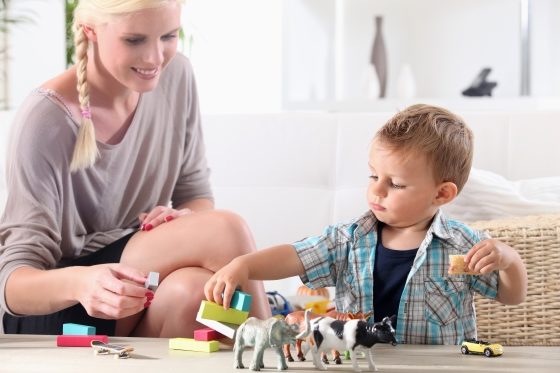For most parents, the holiday season, presents an impossible task. You have to find the gifts your kids will love, and fit your budget.
If that wasn’t enough, the gifts must be educational enough to guarantee your child graduates from a prestigious college and immediately gets an important, six-figure income job.
Even if that gift existed, it wouldn’t have much to offer your child.
For the skeptics, here are just a few reasons why playing pretend is the most timeless, beneficial gift you can give your kids.
Symbolic Thinking
Symbolic thinking may sound pretentious and intimidating, but it’s something everyone uses all the time.

Playing pretend, using a toy to represent another object or person, is the first step toward understanding more abstract symbols, like numbers standing for quantities and letters representing sounds.
Symbolic thinking is one of the most basic foundational building blocks required for learning reading, writing, math and, from there, a variety of subjects.
Empathy and Self-Knowledge
Playing pretend allows kids to try a wide variety of scenarios and subjects. For example, fighting an invading navy of ninja-dragons to opening a grocery store to pretending to be mom or dad.
Playing make believe can also help encourage a young girl’s affinity for building or reveal a young boy’s compassionate nature.
It also allows them the opportunity to imagine what it is like to be someone else, something that helps kids grow out of their ego-centrism and learn that other people have thoughts and feelings that may differ from their own.
Even before they grow out of ego-centrism, kids can be working on important social skills like sharing, taking turns, cooperating, negotiating the rules of a new game or the plot of a story, making new friends or resolving conflicts.
Imagination and Knowledge
Kids use their play time to exercise their imaginations as well as make sense of the world around them, often both at the same time.
Kids learn so much, so rapidly. Play becomes a way to work out, synthesize or understand what they are seeing, hearing, feeling and experiencing.
As kids are still figuring out how the world works, they’re in a way unburdened by the rules and freer to think outside the box.
Encouraging imagination is just as important as instilling factual knowledge.
It’s an ability to think outside the box, to find creative solutions, that has enabled the world’s brightest minds to discover or create much of what we take for granted today.
How You Can Help
Thirty years ago, 40 percent of a preschool day was play. Today?
That number has plummeted to 25 percent.
While changes can and should be made in the way schools teach young children, the easiest, quickest change you can make to benefit your child is to play with your kids at home.
Step One – Reserve Time for Play
Don’t fill kids’ days with so many structured activities they spend all of it being told what to do. Give them time and freedom to choose and direct their own play.
Step Two – Playing With Your Kids
Let them be in charge as much as possible. Use open-ended questions like, “What should happen next?” or “What would happen if?” to encourage their imaginations.
Step Three – Build a Collection of Basic Toys that Encourage Imagination.
Skip the overpriced, over-hyped must-have toys. Build a play box filled with stimulants for the imagination: blocks, dress-up clothes, pots and wooden spoons, old phones, phone books and catalogs, bags, boxes, towels or blankets.
These toys easily lend themselves to a variety of scenarios whereas flashing, battery-operated toys often direct your child’s play rather than encouraging their imagination.
If you like this post then please “Like” this page. Thank you.







